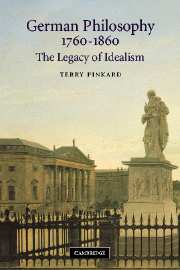Book contents
- Frontmatter
- Contents
- Acknowledgements
- List of abbreviations
- Introduction: “Germany” and German philosophy
- PART I KANT AND THE REVOLUTION IN PHILOSOPHY
- PART II THE REVOLUTION CONTINUED: POST-KANTIANS
- Introduction: idealism and the reality of the French Revolution
- 4 The 1780s: the immediate post-Kantian reaction: Jacobi and Reinhold
- 5 The 1790s: Fichte
- 6 The 1790s after Fichte: the Romantic appropriation of Kant (I): Hölderlin, Novalis, Schleiermacher, Schlegel
- 7 1795–1809: the Romantic appropriation of Kant (II): Schelling
- 8 1801–1807: the other post-Kantian: Jacob Friedrich Fries and non-Romantic sentimentalism
- PART III THE REVOLUTION COMPLETED? HEGEL
- PART IV THE REVOLUTION IN QUESTION
- Conclusion: the legacy of idealism
- Bibliography
- Index
7 - 1795–1809: the Romantic appropriation of Kant (II): Schelling
Published online by Cambridge University Press: 05 June 2012
- Frontmatter
- Contents
- Acknowledgements
- List of abbreviations
- Introduction: “Germany” and German philosophy
- PART I KANT AND THE REVOLUTION IN PHILOSOPHY
- PART II THE REVOLUTION CONTINUED: POST-KANTIANS
- Introduction: idealism and the reality of the French Revolution
- 4 The 1780s: the immediate post-Kantian reaction: Jacobi and Reinhold
- 5 The 1790s: Fichte
- 6 The 1790s after Fichte: the Romantic appropriation of Kant (I): Hölderlin, Novalis, Schleiermacher, Schlegel
- 7 1795–1809: the Romantic appropriation of Kant (II): Schelling
- 8 1801–1807: the other post-Kantian: Jacob Friedrich Fries and non-Romantic sentimentalism
- PART III THE REVOLUTION COMPLETED? HEGEL
- PART IV THE REVOLUTION IN QUESTION
- Conclusion: the legacy of idealism
- Bibliography
- Index
Summary
SCHELLING, SPINOZA, AND FICHTEAN THOUGHT
Few people in modern philosophy rose faster in public esteem and established a more celebrated career than F. W. J. Schelling. Born in southern Germany, in Württemberg, in 1775, he was always a precocious student; at the age of fifteen he was admitted to the Protestant Seminary at Tübingen, where he shared a room with two other students who were to become close friends, G. W. F. Hegel and Friedrich Hölderlin. (Both Hölderlin and Hegel were five years older than Schelling.) He published his first major philosophical work at the age of nineteen and, by the time he was twenty-nine, he had published more philosophy books than most people could even transcribe in a lifetime. By 1798 (at the age of twenty-three), Schelling became an “extraordinary” professor at Jena and Fichte's successor. Each year, with each new publication, Schelling's system seemed to change, leading Hegel later sarcastically to remark in his Berlin lectures that Schelling had conducted his philosophical education in public. Josiah Royce quipped that Schelling was the “prince of the romantics.” Both Hegel and Royce were right; Schelling was ambitious and experimental in temperament, sometimes a bit reckless in his arguments, and he was continually refining and testing out new ideas and ever open to revising old ones. As one of the standard works on Schelling's thought puts it, Schelling's process was always “becoming,” never finished.
- Type
- Chapter
- Information
- German Philosophy 1760–1860The Legacy of Idealism, pp. 172 - 198Publisher: Cambridge University PressPrint publication year: 2002
- 1
- Cited by



